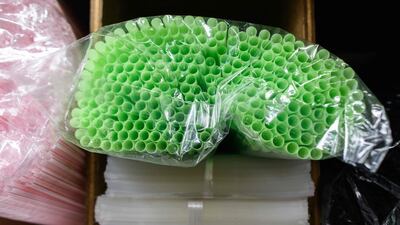On my dish rack right now are several plastic Ziploc baggies of various sizes. After I use them, I flip them inside out, rinse them off, then stand them to dry.
They look a bit like sad jellyfish and add to the already cluttered state of my kitchen, but I can’t bring myself to throw them away.
The bags go along with the stash of plastic water bottles, most of which have lost their caps and thus can’t be re-used, but as with the bags, I can’t bring myself to throw them away. In my effort to avoid plastic waste, I seem to have become a plastic hoarder.
That's why the other day when I drove by Khalidiyah Park, just at the corner of Khaleej Al Arabi, I almost caused a traffic accident: I had to stare at the huge recycling stand, brightly colored and clearly labelled. At this stand you can rid yourself of almost anything, including old medicines and, of course, plastics. Here's hoping that this station will be emptied correctly, instead of what we've all seen elsewhere: carefully separated trash being dumped willy-nilly into one big truck.
The National given significant coverage in recent months to the issue of plastic waste in the UAE, which as a country ranks close to the top in the world in terms of waste. Unlike World Cup standings, however, this table is one where you want to hover close to the bottom. That brightly colored recycling station - if there were more of them - might help Abu Dhabi move down in the standings.
Some of you might be old enough to remember the moment in The Graduate, when an impossibly young Dustin Hoffman receives career advice: “Plastics,” he’s told, “there’s a great future in plastics.”
It’s true: plastic has become the future, and not just because of the technology that invented it. The new-fangled Tupperware from that 1967 film is probably still around, forty years into the future: plastic takes more than 100 years to break down, if it breaks down at all.
According to an article last year in The National, of the 80 million tonnes of waste generated in the country, plastics makes up about a third. And that straw you're using right now to sip your Starbucks coffee concoction? It's never going to vanish; it's too small for standard recycling and yet we utilize 50,000,000 straws every day.
A friend of mine came back from a trip to Morocco the other day and showed me a small cloth sack, so simple in its outline that children could stitch it together in minutes. He said these sacks are what get used in grocery stores and vegetable stands all over the country instead of plastic. Simple and small enough to stash in a pocket, these bags raise the question of why Abu Dhabi can’t follow suit.
_____________
Read more:
Recycling in Abu Dhabi is about to get a lot more efficient
Waitrose Abu Dhabi trial sees 75 per cent drop in plastic bag use
Abu Dhabi's growing waste problem
_____________
We could blame the bottled-water manufacturers, or Starbucks for this plastics problem, or maybe we should blame lemons, which come singly and are thus hard to carry unless they’re in a sack.
Unfortunately, however, the plastics problem stems from us, and our inherent desire to take the path of least resistance, a path made smooth by the magic of plastic. It’s hard to resist those handy-dandy bags, straws, cutlery—all those symbols of “convenience,” but you know what will be a serious inconvenience? Dead oceans.
When you measure your need for a plastic fork against “the ocean,” doesn’t the fork seem like something you don’t need to include with your delivery order? I know, I know, we all say “it’s just one fork” – but we all say “it’s just one straw” and suddenly we have enough straws to circle the globe several times over.
That recycling station outside Khalidiyah Park will become a regular stop on my errand rotation, although I am still going to wash out and re-use my baggies. And when I can’t use them any longer, I might just stash them in the back closet.
It’s not convenient, but I don’t want to risk my old baggies becoming deadly snack for some innocent sea-bird, and I’m willing to risk spilling my Starbucks on my shirt in order to prevent that bright green straw ending up wedged in some turtle’s nose.


